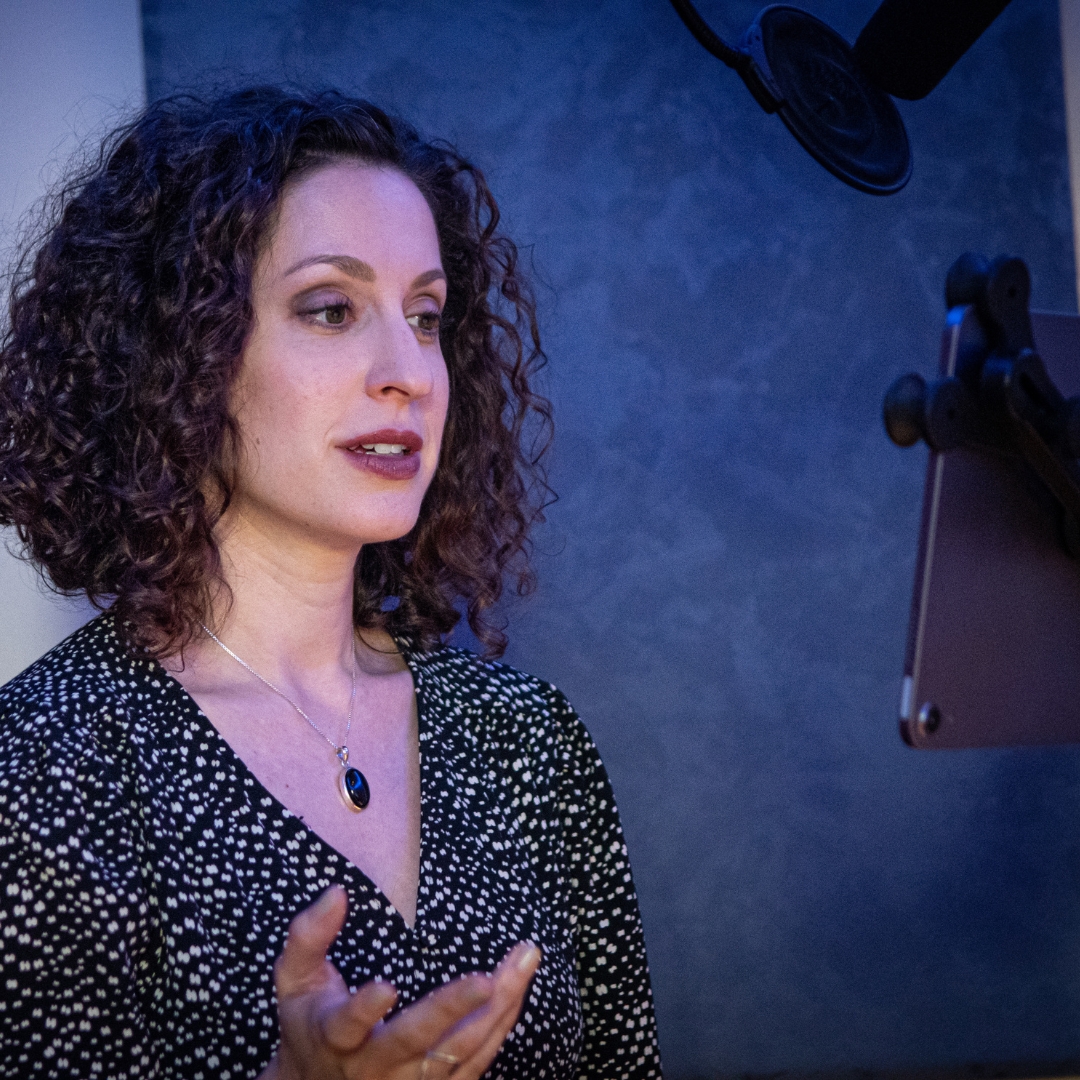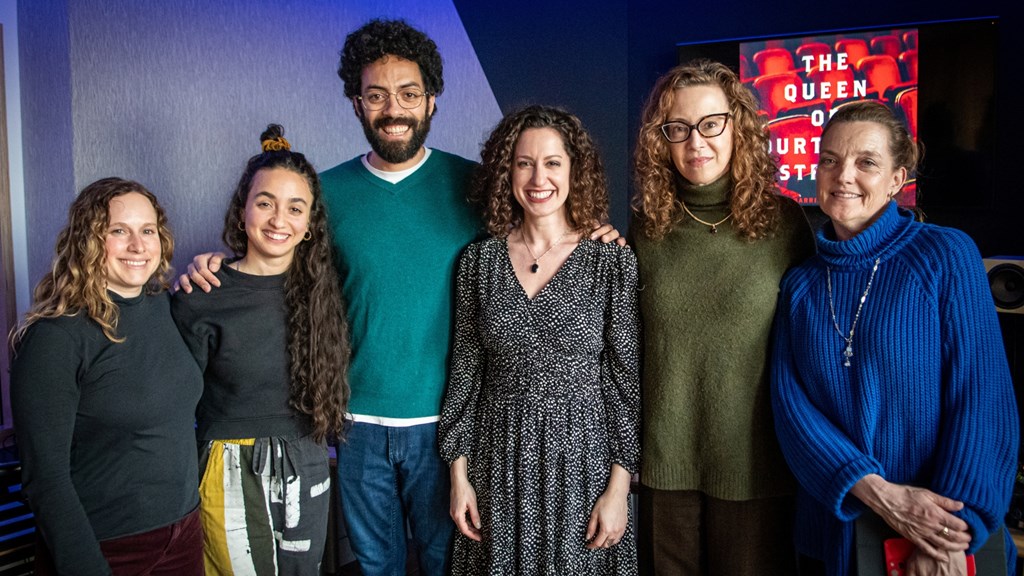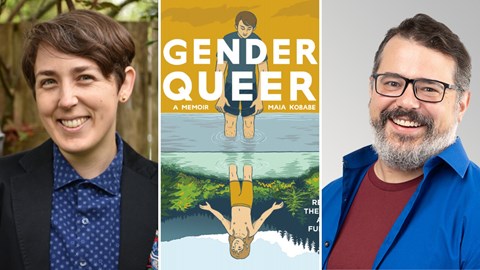AudioFile's Laura Sackton spoke with playwright and narrator Barrie Kreinik and Hachette Audio producer Thomas Mis about the audio original THE QUEEN OF FOURTEENTH STREET, adapted from the play that Barrie wrote.
AudioFile: Barrie, you wrote an earlier iteration of the play for the stage. What was it like adapting it for audio? Did it pose any challenges?
B arrie Kreinik: The main challenge in adapting the play for audio was the need to convey physical action through sounds or words. For example, there’s a scene in which we meet a series of Eva’s lovers: In the stage play, it was a dance sequence, but for the audio drama, I turned it into dialogue. I also replaced stage directions with sound effects, so a phrase like “she exits” became “the door closes.” And I cut the kissing, as it’s much more romantic to see a kiss than to hear one!
arrie Kreinik: The main challenge in adapting the play for audio was the need to convey physical action through sounds or words. For example, there’s a scene in which we meet a series of Eva’s lovers: In the stage play, it was a dance sequence, but for the audio drama, I turned it into dialogue. I also replaced stage directions with sound effects, so a phrase like “she exits” became “the door closes.” And I cut the kissing, as it’s much more romantic to see a kiss than to hear one!
AF: The audiobook was performed and recorded in one sitting by the entire cast all together—much like live theater. What inspired this choice? What was the experience like, and did anything about it surprise you, or give you new insight into the play?
Thomas Mis: It was at Barrie’s suggestion that we record this way—and it paid off in spades. There’s a real energy in the room that simply can’t be reproduced by stitching together separate takes. The dialogue in QUEEN is so snappy and energetic, and it really moves like a Broadway play, and after the first rehearsal, I realized it was 100% necessary to record this way. It really helped us iron out the pacing—our director, Caitlin Davies, was really able to take charge at the head of the table and finesse the more complex scenes, allowing the performers to do what they do best—perform!
BK: I wanted QUEEN to resemble the radio plays of the 1930s, which were often performed in front of live audiences, like stage plays. I also wanted the dialogue to have immediacy and authenticity, which I felt we could only achieve if the actors were in the same room. We had a rehearsal the week before the recording session, which was magical—the play came alive through the actors’ characterizations, and we all got on famously and made each other laugh. The session itself was a bit like a film shoot: Caitlin guided us through a few takes of each scene, making subtle adjustments, and then we moved on to the next. It went by very quickly, and afterward I felt a little bereft! A stage play gets to grow from performance to performance, whereas a recording is one-and-done, and I wanted to spend more time in the world we created together. But it was a truly amazing day, and I’m very proud of the work we did.
 AF: The production is so rich, with so many different voices—and sounds like more than five narrators! Every character feels unique. This mirrors the style of the repertory theater Le Gallienne founded. How did you come to the decision to have each actor perform several different roles?
AF: The production is so rich, with so many different voices—and sounds like more than five narrators! Every character feels unique. This mirrors the style of the repertory theater Le Gallienne founded. How did you come to the decision to have each actor perform several different roles?
BK: That was my exact goal: to mirror the function of a repertory theater. I wanted the structure of the play to be as much a tribute to Le Gallienne’s work as the content. I deliberately chose narrators with stage acting experience, because they could handle heightened language with emotional depth and bring huge vocal variety to their characters, creating a range of colorful voices just as they do when narrating audiobooks. I cannot say enough about how brilliantly Elisabeth, Imani, Orlagh, and James performed their roles!
TM: I could not be more thrilled with this cast! Their theater background really aided them in flexibility in transitioning between characters. Ultimately, yes, it does reflect the style of repertory theater that Eva aimed for. I think of Barrie as a modern-day Eva in that way. The casting process for this one was interesting. Barrie and I came up with our wishlist/dream casting, asked for a small sample of dialogue for their major characters, and we were off!
AF: Barrie, in the note at the end of the play, you mention that you spent years looking through the archives and reading Eva Le Gallienne's letters and papers. How did you decide what part of her life to focus on? Anything amazing you discovered that it pained you to leave out?
BK: I always knew I wanted to focus on the time period covered in Le Gallienne’s first autobiography, At 33: her European childhood, her early career in London, her Broadway stardom, and the rise and fall of the Civic Rep on Fourteenth Street. Those decades held the most interest for me because of the passion and energy that propelled her through them, and because of the sheer variety of roles she played, people she met, and adventures she had. So in my archival research, I focused on materials that dated from that era. I’d have liked to go into more detail about a few of her relationships, but they weren’t germane to the play’s central plotline, so they had to take a backseat to other elements.
AF: After spending so much time researching and writing the play, what was it like playing Eva for the audio production?
BK: I spent the weeks leading up to the recording session immersing myself in the sound of Eva’s voice, listening to every recording I could get my hands on: video clips, radio interviews, even LPs. I studied her accent, vocal placement, and pitch pattern, rehearsing at home until speaking like her felt natural. My goal was to be able to get into the studio and embody her voice, rather than putting it on. While recording, whenever I felt self-conscious, I focused on connecting with my scene partners. By the end of the day, I found myself tilting my head the way Eva did, making hand gestures I’d seen in videos—channeling her, really. I think I achieved the embodiment I was aiming for.
AF: Eva Le Gallienne is well-known in the theater world, but some listeners might be encountering her for the first time thanks to the play. What is your hope for the play, in terms of bringing Le Gallienne's legacy to light? Do you have recommendations for any other media that newly-minted Le Gallienne fans can pursue next?
BK: My hope is that she’ll be restored to her rightful place in the pantheon of 20th-century theater artists. I want theater students to learn about her extraordinary work. I want queer people to be inspired by how boldly she lived her life. I want audiences to fall in love with her passion, her uniqueness, her perseverance and pioneering spirit. If people want to learn more about her, the place to start is the beautifully written, comprehensively researched biography Eva Le Gallienne by Helen Sheehy, published in 1996 by Knopf, which is available in hardcover and ebook. It’s a captivating read and the best published source of information about Le Gallienne. I returned to it time and again throughout my writing process.
--
Photos courtesy of Hachette Audio. Header photo from l to r: Caitlin Davies (director), Imani Jade Powers, James Fouhey, Barrie Kreinik, Elisabeth Rodgers, and Orlagh Cassidy.
AudioFile Magazine is your #1 source for audiobook reviews.






